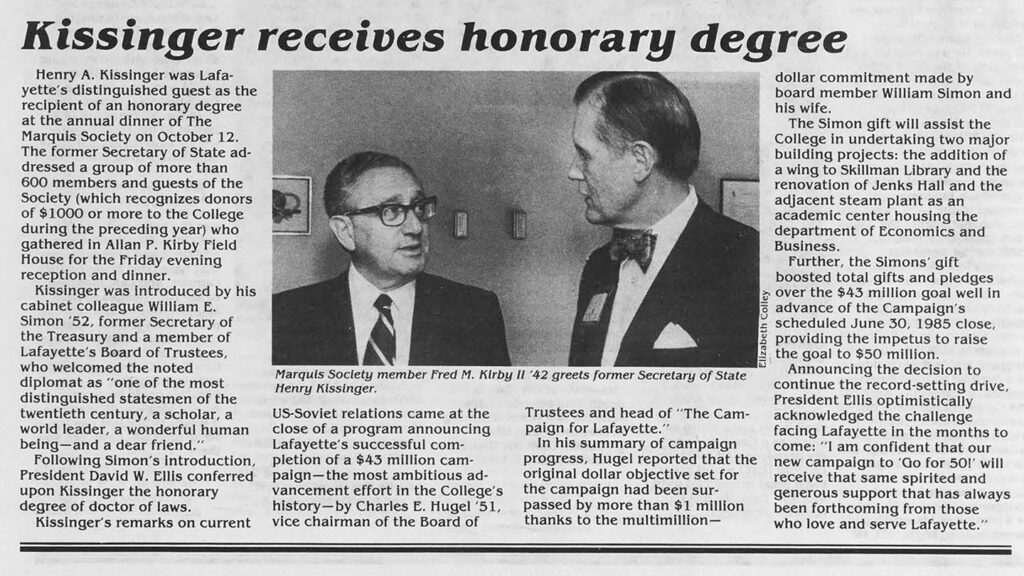Henry Kissinger’s Lafayette connections
Henry Kissinger, the veteran diplomat who died on Wednesday at age 100, had strong connections to Lafayette, where he received some of his first academic training and later an honorary degree.
In 1943, the year he became a U.S. citizen after he and his family fled Nazi Germany, Kissinger was drafted into the U.S. Army, which recognized his intellect and identified him for a role in military intelligence. The Army Specialized Training Program (ASTP), in which he was enrolled, trained academically talented soldiers ages 18-21 for leadership roles during World War II.
As part of the program, Kissinger was sent to Lafayette. According to the College Archives, which has his ASTP student record while at Lafayette, he enrolled in Basic Engineering I for two terms (1943-44) and took courses in physics, geography, English, math, chemistry, history, and military science.
In the February 1973 edition of a Lafayette alumni newspaper, Charles J. Coyle ’50, who also studied at Lafayette in 1943-44 under the Army Specialized Training Program and roomed with Kissinger, recalled the intellectual curiosity displayed by the future statesman.
“He didn’t read books. He ate them, with his eyes, his fingers, with his squirming in the chair or bed, and with his mumbling criticism,” said Coyle, noting that Kissinger would slouch over a book and suddenly explode with an indignant, German-accented curse word, blasting the author’s reasoning. “Then he’d tear it apart, explosive words prevailing, and make sense of it.”
When the Army canceled the program in 1944, Kissinger was reassigned to the 84th Infantry Division and left for Europe in September 1944. He eventually served as a German translator when the division reached Germany.
Kissinger, who went on to serve as secretary of state in the Nixon and Ford administrations, returned to Lafayette to speak at the annual Marquis Society dinner on Oct. 12, 1984, receiving an honorary degree of doctor of laws.

An article from an alumni newspaper about Henry Kissinger’s 1984 visit to campus.
Kissinger was introduced by his cabinet colleague William E. Simon ’52, former secretary of the treasury and a member of Lafayette’s Board of Trustees at the time. He welcomed the noted diplomat as “one of the most distinguished statesmen of the 20th century, a scholar, a world leader, a wonderful human being—and a dear friend.”
4 Comments
kissinger was a monster and a war criminal <3
Excellent story, and great to see publicized both the Lafayette connection for Kissinger as well as the Bill Simon ’52 one. I met Kissinger on two occasions and had a brief chat. On both I told him we shared a college connection. When he responded with a smile, “Harvard?” and I replied,”No, Lafayette,” we both had a good chuckle.
Bill Watt, my father in law, once told me that Kissenger had been a student of his at Lafayette–presumably in English–in the 40’s..
Bill went on to serve in the Navy, including in the office of the Port Director in Nagasaki. Returned to Lafayette, post war, and taught there for many years, chairing the English Dept
George M. Friend (BA Harvard ’62; MA & PhilM, Toronto)
The former US Secretary of State left a bloody legacy that requires reckoning. It’s crucial to remember, for instance, Henry Kissinger’s support for General Augusto Pinochet’s brutal regime in Chile and his approval of Indonesia’s invasion and subsequent violent occupation of East Timor in 1975. Additionally, historical records indicate that between 1969 and 1973, Kissinger orchestrated an unlawful bombardment of Cambodia. According to historian Greg Grandin, Kissinger’s actions in Cambodia and Chile, among other places, reflected a worldview that blatantly disregarded human life. For Grandin, we live under “Kissinger’s shadow,” as policymakers continue to follow a consistent and ongoing pattern that Kissinger helped establish: one of military interventions and conflicts abroad, bringing death, destruction, and misery to millions.
Comments are closed.